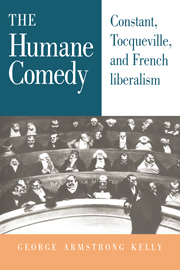3 - IN PARTIBUS FIDELIUM
Published online by Cambridge University Press: 31 March 2010
Summary
FAITH IN FREEDOM
Beyond the liberal religious disputations of Constant and Tocqueville, a wider matter solicits our attention: how may faith be said to support political authority, participate in liberty, and establish relations with the new post-Revolutionary society? It might at first seem that liberalism had made men and nations free of faith, thus serving as midwife for the secularist dreams of the Enlightenment. But, like the seventeenth, the nineteenth century in France is justly called “religious” – especially in the sense of a rebuilding, a “reveil” in which politics has its part. What is the part of liberal thought in this project?
As regards the relationship of practical truth, religious belief, and the liberty and dignity of man, the surface position of liberalism is clear. Liberty of faith or, more generally, of conscience is one of a number of guarantees without which a regime suited to liberty and dignity cannot exist. But is this merely a permission to have a faith or not to have it – an indifference of politics to the question of faith – or does it enjoin some new sort of faith?
The moral objective of many liberalisms (though not all) is to define an ideal order toward which human beings will strive through education and by shedding their bondage to the grosser appetites. This “logic of transcendence,” as Bénichou puts it, must be “created outside the pathways of Christian [or presumably any other] dogmatism.” But can there be a transcendent logic of liberty operating as an ideal without the guidance of a cohesive cult?
- Type
- Chapter
- Information
- The Humane ComedyConstant, Tocqueville, and French Liberalism, pp. 85 - 133Publisher: Cambridge University PressPrint publication year: 1992



